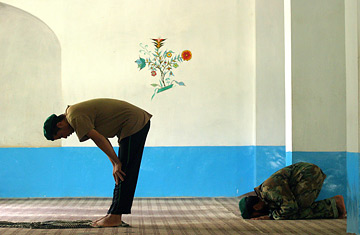
Afghan soldiers participate in afternoon prayers.
Reams have been written on the differences between Islamic and Western societies, but for sheer pithiness, it's hard to beat a quip by my former colleague, a Pakistani scholar of Islamic studies. I'd strolled into his office one day to find him on the floor, at prayer. I left, shutting his door, mortified. Later he cheerfully batted my apologies away. "That's the big difference between us," he said with a shrug. "You Westerners make love in public and pray in private. We Muslims do exactly the reverse."
At the nub of debates over Muslim integration in the West lies the question, What's decent to do in public--display your sexuality or your faith? The French have no problem with bare breasts on billboards and TV but big problems with hijab-covered heads in public schools and government offices. Many Muslims feel just the opposite. As my friend suggested, Westerners believe that prayer is something best done in private, a matter for individual souls rather than state institutions. In the Islamic world, religion is out of the closet: on the streets, chanted five times daily from minarets, enshrined in constitutions, party platforms and penal codes. Sexual matters are kept discreet.
Just how much so has become clear in recent weeks, with news of concerns for the safety of an Afghan child actor in the soon-to-be-released movie based on the best-selling novel The Kite Runner. Family members of Ahmad Khan Mahmidzada, whose character is raped, fear that the film will expose them to reprisals. In Afghan tribal society, sexual violation--even its portrayal in a fictional movie--can lead to dishonor, ostracism or worse. Mahmidzada's father told the BBC that members of his tribe "may cut my throat, they may kill me, torture me." The filmmakers, he claims, initially said they wouldn't film the rape scene. Producers deny misleading the actor and his family. The offending scene is tastefully portrayed, they say, and crucial to the plot. Still, Paramount Vantage, the film's distributor, is taking the security fears seriously. Having dispatched a retired CIA operative to Afghanistan to assess the dangers, it decided to delay the film's U.S. release by six weeks, allowing time to evacuate its child stars to the United Arab Emirates.
The West traditionally reveres free speech, with both sublime and ridiculous results. As The Kite Runner's producers hinted, it's crucial for art. It's also the backbone of ideals like democracy and human rights, as well as the protector of rather more tawdry material like reality TV and Internet porn. We reward those who reveal their private lives. When Oprah Winfrey spoke of her childhood sexual abuse, she became a goddess in a society convinced that it's good to talk. While thousands of courageous Muslims regularly speak out on taboo subjects, the reception is often not so warm. Five years ago, Mukhtar Mai, a Pakistani gang-rape victim, defied tribal custom by taking her rapists to court. In the West, she won plaudits and prizes, but in Pakistan, her legal struggle against her accused rapists continues, and she has been widely denounced as having shamed her country abroad.
So here is a sweeping generalization, but perhaps a useful one: Western societies are cultures of personal revelation and exposure, while Muslim cultures are traditionally structured around protecting honor and propriety. On our shrunken planet, the two codes bump up against each other, throwing the other into relief. The same era that's given us Big Brother and a cybervideo of Paris Hilton in flagrante has also produced a striking rise of Western Muslims taking up the veil. The more of private life that Western pop culture reveals, the more that Muslim women decide to conceal. And the differences between the culture of exposure and the culture of propriety go far beyond sex and sartorial choices.
One of my first journalistic assignments came from an American women's magazine. During a 1994 U.N. population conference in Cairo, CNN had aired footage of the backstreet female genital mutilation of a 10-year-old Egyptian girl. Egypt's conservatives claimed that CNN and the girl's family had shamed Egypt on the world stage. A year on, I was asked to find the girl and do an update. But after a few phone calls in Cairo, I begged off the assignment: the girl was in hiding, fearing reprisals. My editors in New York assumed she'd want to "tell her story." But interviewing the girl again, I had to explain, could bring as much shame and danger as the circumcision knife.
Of course, the two worlds can meet. Afghan Shah Muhammad Rais claimed that his betrayal as a domestic tyrant in the global best-seller The Bookseller of Kabul, by Norwegian journalist Asne Seierstad, exposed him to dishonor. So Rais did a very Western thing, launching a lawsuit against Seierstad for defamation in Norway. Then he went one better: Rais now has a deal with a Norwegian publisher for a book of his own. A spot on Oprah has to be next.
